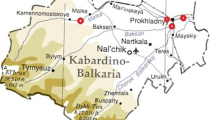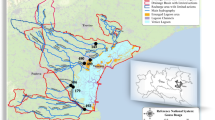Abstract
Longitudinal monitoring studies (between 2006 and 2019) of the chemical composition of the water from the Angara River source (the runoff of Lake Baikal) revealed the interannual, year-round and monthly cyclicity in the distribution of some trace elements vis-à-vis their concentrations. The change in the concentrations of elements was contingent on the season, the temperature of the air and water, the activity of phyto- and zooplankton and regional changes in the environment (floods, earthquakes, fires, tourism, ships, technogenesis etc.). We compared the concentrations of trace elements present in the water samples from the Angara source and the water samples from Lake Baikal with the maximum permissible concentration values for drinking water. The calculated (median) concentrations for water samples from the Angara source, which spanned the entire study period, were close to the data obtained for the Baikal water.









Similar content being viewed by others
Data availability
The datasets generated during and/or analysed during the current study are not publicly available because these long-term monitoring data serve as material for subsequent publications by the authors.
References
Alieva, V. I., Grebenshchikova, V. I., & Zagorulko, N. A. (2011). Long-term monitoring and modern methods of studying the microelement composition of the waters of the Angara River. Engineering ecology, 3, 24–34 (in Russian).
Blinov, V. V., Granin, N. G., Mizandrontsev, I. B., Gnatovsky, R. Y., & Zhdanov, A. A. (2017). Seasonal changes of the vertical structure of the water column of the pelagic zone of southern Lake Baikal. Journal of Water Resources, 44, 285–295. https://doi.org/10.1134/S0097807817030058
Bochkarev, P. F. (1959). Hydrochemistry of the rivers of Eastern Siberia. Irkutsk book publishing house (in Russian).
Ciesielski, T., Pastukhov, M. V., Szefer, P., & Jenssen, B. M. (2010). Bioaccumulation of mercury in the pelagic food chain of the Lake Baikal. Chemosphere. https://doi.org/10.1016/j.chemosphere.2009.12.070
Control of chemical and biological parameters of the environment. (1998). St. Petersburg: Ecological and analytical information center Soyuz. In: L. K. Isaev (ed.). (in Russian)
Didenkov, Y. N., Bychinsky, V. A., & Lomonosov, I. S. (2006). The possibility of an endogenous source of fresh waters in rift settings. Journal of Geology and Geophysics, 47(1), 1114–1118.
Evstropyeva, O. V. (2016). Development of the tourism system on the Baikal natural Territory. Journal Geography and Natural Resources. https://doi.org/10.21782/GIPR0206-1619-2016-5(184-195)
Falkner, K. K., Measures, C. I., & Herbelin, S. E. (1991). The major and minor element geochemistry of Lake Baikal. Limnology and Oceanography, 36(3), 413–423.
Filatov, N. N., Vyruchalkina, T. Y., Dianskiy, N. A., Nazarova, L. E., & Sinukovich, V. N. (2016). Intrasecular variability in the level of the largest lakes of Russia. Journal of Doklady Earth Sciences. https://doi.org/10.7868/S0869565216110177
Galazii, G. I. (2012). Baikal in questions and answers. "Forward" LTD. Irkutsk.
Glazunov, I. V. (1963). Hydrochemical regime of Lake Baikal in the area of the village Listvyanka. Hydrochemical studies of Lake Baikal. Proceedings of the Limnological Institute, Moscow, Publishing Nauka, III (XXIII), 57–94. (in Russian)
Grachev, M. A. (2002). On the current state of the ecological system of Lake Baikal. Publishing HOUSE of SB RAS (in Russian).
Grachev, M. A., Domysheva, V. M., Khodzher, T. V., Korovyakova, I. V., Golobokova, L. P., Pogodaeva, T. V., et al. (2004). Deep water of Lake Baikal – Natural standard of fresh water. Chemistry for Sustainable Development, 12, 417–429.
Granina, L. Z. (2008). Early diagenesis of bottom sediments in Lake Baikal. Academic Publishing HOUSE GEO.
Grebenshchikova, V. I., Kuzmin, M. I., Doroshkov, A. A., Proydakova, O. A., & Tsydypova, S. B. (2019a). The cyclicity of the changes in the chemical composition of the water source of the Angara River (Baikal Stock) in 2017–2018 in comparison with the last 20 years of data. Environmental Monitoring and Assessment. https://doi.org/10.1007/s10661-019-7888-z
Grebenshchikova, V. I., Kuzmin, M. I., Dorochkov, A. A., & Zarubina, O. A. (2019b). Using geochemical monitoring to assess the impact of the environment on the ecosystem of Lake Baikal (Russia). IOP Conference Series: Earth and Environmental Science. https://doi.org/10.1088/1755-1315/381/1/012030
Grebenshchikova, V. I., Kuzmin, M. I., Projdakova, O. A., & Zarubina, O. V. (2018). Long-term geochemical monitoring of the source of the Angara River (the runoff of Lake Baikal). Journal of Doklady Earth Sciences. https://doi.org/10.1134/S1028334X18060028
Grebenshchikova, V. I., Kuzmin, M. I., Suslova, MYu., Shtykova, Yu. R., & Doroshkov, A. A. (2019c). Chemical composition and water quality of the Baikal ecosystem in 2018. IOP Conferece Series: Earth and Environmental Science. https://doi.org/10.1088/1755-1315/320/1/012030
Grebenshchikova, V. I., & Zagorulko, N. A. (2013). Long-term monitoring studies of macro- and micro-component compo- sition of the Angara River source. Journal Vestnik IGSHA, II(57), 88–95 (in Russian). http://www.igsha.ru/science/files/v57-2.pdf#page=88
Grebenshchikova, V. I., Zagorulko, N. A. & Pastukhov M. V. (2011). Study of ionic water structure of River Angara (Lake Baikal). Water: Chemistry and Ecology, 4, 2–8 (in Russian) https://www.elibrary.ru/item.asp?id=16990026
Hachikubo, A., Khlystov, O., Krylov, A., Sakagami, H., Minami, H., Nunokawa, Y., et al. (2010). Molecular and isotopic characteristics of gas hydrate-bound hydrocarbons in southern and central Lake Baikal. Geo-Marine Letters, 30(3–4), 321–329.
Khodzher, T. V., Domysheva, V. M., Sorokovikova, L. M., Sakirko, M. V., & Tomberg, I. V. (2017). Current chemical composition of Lake Baikal water. Inland Waters. https://doi.org/10.1080/20442041.2017.1329982
Khodzher, T. V., Domysheva, V. M., Sorokovikova, L. M., Tomberg, I. V., & Sakirko, M. V. (2018). Hydrochemical studies in Lake Baikal: History and nowadays. Limnology and Freshwater Biology, https://doi.org/10.31951/2658-3518-2018-A-1-49
Koval, P. V., Udodov, Yu. N., Andrulaitis, L. D., Gapon, A. E., Sklyarova, O. A., & Chernikova, S. E. (2005). Hydrochemical characteristics of surface runoff of Lake Baikal (1997–2003). Journal of Doklady Earth Sciences, 401(3), 452–455.
Koval, P. V., Udodov, Yu. N., Andrulaitis, L. D., & San’kov, V. A., & Gapon, A. E. (2003). Mercury in the source of the Angara River: Five-year concentration trend and possible reasons for its variations. Journal of Doklady Earth Sciences, 379(2), 282–285.
Lackner, M., Ouattara, I., Gharaei, N. A., & Abolhassani, R. (2020). Clean drinking water global scarcity: A review. Journal of Water Science and Engineering, 1(5), 1–19.
Osipov, V. I. (2019). Environmental aspect of sustainable development. Bulletin of the Russian Academy of Sciences, https://doi.org/10.31857/S0869-5873897718-727
Ovchinnikova, T. E., & Bocharov, O. B. (2017). Numerical modelling of water exchange processes in Lake Baikal. Journal of Water Resources. https://doi.org/10.1134/S0097807817030150
Parshin, A. V., Shestakov, S. A., Chudnenko, K. V., & Savelyev, E. P. (2013). Evaluation criteria of water geoecological state of the Lake Baikal. Journal of Water: Chemistry and Ecology, 9, 24–31 (in Russian).
Perrot, V., Epov, V. N., Pastukhov, M. V., Grebenshchikova, V. I., Zouiten, C., Sonke, J. E., et al. (2010). Tracing sources and bioaccumulation of mercury in fish of Lake Baikal− Angara River using Hg isotopic composition. Science & Technology. https://doi.org/10.1021/es101898e
Rossolimo, L. L. (1971). Baikal. Publishing Vost-Sib. (in Russian)
Shimaraev, M. N., Kuimova, L. N., Sinyukovich, V. N., & Tsekhanovsky, V. V. (2002). On the manifestation of global climate change in the 20th century on Lake Baikal. Journal of Doklady Earth Sciences, 383(3), 397–400 (in Russian).
Shimaraev, M. N., & Troitskaya, E. S. (2018). Current trends in upper water temperature in coastal zones of Baikal. Journal of Geography and Natural Resources, https://doi.org/10.21782/GIPR0206-1619-2018-4
Shimaraev, M. N., Troitskaya, E. S., Blinov, V. V., Ivanov, V. G., & Gnatovskii, R. Y. (2012). Upwellings in Lake Baikal. Journal of Doklady Earth Sciences. https://doi.org/10.1134/S1028334X12020183
Shpeizer, G. M., Dedova, L. I., Dyuberg, V. M., Evsyutin, A. G., Zhucheva, T. V., Kuimova, L. P., et al. (2000). Water ecological monitoring and water quality of the Angara River. Materials of the 1st scientific and methodological seminar “State of the river. Hangars and ways of managing the use of resources and their quality”. (2nd ed., pp. 49–64). Moscow Public Science Foundation.
Sklyarov, E. V., Sklyarova, O. A., Lavrenchuk, A. V., & Menshagin, Yu. V. (2015). Natural pollutants of Northern Lake Baikal. Environment and Earth Science. https://doi.org/10.1007/s12665-015-4201-5
Sklyarova, O. A. (2011). Distribution of trace elements in the water column of middle Baikal. Geography and Natural Resources, 32(1), 53–59.
Suslova, MYu., Pestunova, O. S., & Parfenova, V. V. (2017). Water quality assessment in the Selenga River and its delta in terms of sanitary and microbiological indices. Hydrobiological Journal, 1(53), 74–84.
Suslova, M., Yu, Shtykova, Yu. R., Sukhanova, E. V., Podlesnaya, G. V., Kostornova, T. Ya., Grebenshchikova, V. I., et al. (2019). The use of microbiological monitoring to assess the impact of the anthropogenic influence on the ecosystem of Lake Baikal. IOP Conference Series: Earth and Environmental Science. https://doi.org/10.1088/1755-1315/381/1/012088
Timoshkin, O. A., Samsonov, D. P., Yamamuro, M., Moore, M., Belykh, O. I., Malnik, V. V., et al. (2016). Rapid ecological change in the coastal zone of Lake Baikal (East Siberia): Is the site of the world’s greatest freshwater biodiversity in danger? Journal of Great Lakes Research. https://doi.org/10.1016/j.jglr.2016.02.011
Vasil’eva, I. E., & Shabanova, E. V. (2017). Certified reference materials of geological and environmental objects: Problems and solutions. Journal of Analytical Chemistry, 72(2), 129–146. https://doi.org/10.7868/S0044450217020141 https://www.elibrary.ru/item.asp?id=28918450
Vetrov, V. A., & Kuznetsova, A. I. (1997). Trace elements in the natural environment of Lake Baikal. Publishing Nauka (in Russian).
Vetrov, V. A., Kuznetsova, A. I., & Sklyarova, O. A. (2013). Baseline levels of chemical elements in the water of Lake Baikal. Geography and Natural Resources, 34(3), 228–238. https://doi.org/10.1134/S1875372813030062
Vorobyev, N. V., Emelyanova, N. V., Vorobyev, O. V., & Valeeva, O. V. (2016). Population distribution and dynamics in the central ecological zone of the Baikal natural territory. Journal of Geography and Natural Resources, 5, 168–178. https://doi.org/10.21782/GIPR0206-1619-2016-5(168-178)
Vorobyeva, I. B., Vlasova, N. V., & Belozertseva, I. A. (2019). Tourism on the northern Baikal coast and environmental problems. Geography and natural resources, 5, 27–32. https://doi.org/10.21782/GIPR0206-1619-2019-5(27-32)
Votintsev, K. K. (1961). Hydrochemistry of Lake Baikal. Publishing Nauka (in Russian).
Votintsev, K. K., & Glazunov, I. V. (1963). Hydrochemical regime of Lake Baikal in the area of the village Listvyanka. Hydrochemical studies of Lake Baikal. Proceedings of the Limnological Institute, Moscow, Publishing Nauka, III (XXIII), 3–56. (in Russian)
Funding
This study was conducted employing project no. 0350-2019-0005 AAAA-A17-117041910034-5 and bankrolled through the RFBR grant (no. 17-29-05022 ofi_m).
Author information
Authors and Affiliations
Corresponding author
Additional information
Publisher's Note
Springer Nature remains neutral with regard to jurisdictional claims in published maps and institutional affiliations.
Rights and permissions
About this article
Cite this article
Grebenshchkova, V.I., Kuzmin, M.I. & Suslova, M.Y. Long-term cyclicity of trace element in the Baikal aquatic ecosystem (Russia). Environ Monit Assess 193, 260 (2021). https://doi.org/10.1007/s10661-021-09021-1
Received:
Accepted:
Published:
DOI: https://doi.org/10.1007/s10661-021-09021-1




